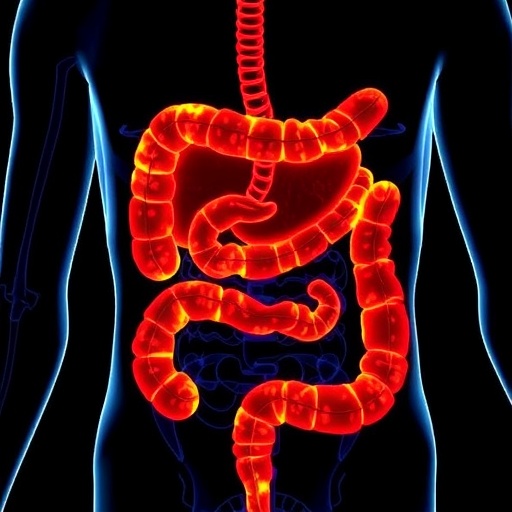In a groundbreaking discovery that could reshape our understanding of autoimmune conditions and gut health, researchers have uncovered an unexpected role for a genetic mutation previously associated exclusively with skin disorders. The investigation, conducted by a collaborative team of scientists from the VIB-UGent Center for Inflammation Research, Ghent University, University of Barcelona, and University College London, reveals that mutations in the CARD14 gene, well-documented in psoriasis patients, also exert profound effects on intestinal physiology and immunity. This revelation, detailed in their recent publication in EMBO Molecular Medicine, highlights the intricate interplay between genetics, immune signaling, and organ system crosstalk, marking a paradigm shift in how we perceive systemic effects of localized genetic variants.
The CARD14 gene encodes a scaffolding protein pivotal in activating NF-κB signaling pathways, which are central to immune responses and inflammation. While the mutation’s role in inciting aberrant immune activation in keratinocytes, leading to psoriasis, is well-established, the team’s pioneering approach interrogated its function beyond the skin. By leveraging a transgenic mouse model engineered to express the human psoriasis-associated CARD14 mutation specifically within intestinal epithelial cells (IECs), they meticulously dissected the mutation’s influence on gut physiology and immunity. Their findings demonstrated that this mutation induces a measurable delay in intestinal transit time, even in the absence of overt epithelial barrier disruption or enteric neuronal loss, suggesting that CARD14 impacts gut motility via novel mechanisms.
Delving deeper, transcriptomic analyses of IECs revealed a distinct gene expression signature driven by mutant CARD14. Among the most striking changes was the downregulation of antimicrobial peptides predominantly secreted by Paneth cells—specialized epithelial cells residing at the base of crypts within the small intestine. These peptides, including alpha-defensins, play a critical role in shaping the gut microbiota and maintaining mucosal immune homeostasis. The reduction in their production, as driven by mutant CARD14 signaling, correlated strongly with a decline in microbial diversity, a hallmark feature implicated in numerous gastrointestinal diseases.
The study further probed the functional consequences of this disturbed epithelial-immune cross-communication. The altered microbial landscape potentiated susceptibility to enteric bacterial pathogens, rendering the mice more vulnerable to infections. This immunocompromised state was accompanied by a subtle but consistent increase in mucosal inflammation, characterized by elevated expression of pro-inflammatory cytokines, albeit without histological damage to the intestinal lining. These findings suggest a state of subclinical inflammation that could predispose affected individuals to progressive intestinal disorders.
Lead author Aigerim Aidarova emphasized the importance of these insights, stating, “Our work reveals that CARD14’s impact extends well beyond the skin barrier, influencing gut physiology in ways that may not manifest overtly but have significant clinical implications. Patients harboring this mutation may unknowingly experience intestinal symptoms that warrant closer clinical attention.” Such manifestations may include altered bowel habits or increased susceptibility to gastrointestinal infections, symptoms often overlooked in dermatological assessments.
Importantly, the researchers also noted that these effects did not stem from damage or alterations in the enteric nervous system—long implicated as a key regulator of gut motility—pointing instead to epithelial-intrinsic changes orchestrated by aberrant CARD14 signaling. This challenges conventional paradigms and highlights a novel epithelial-centered mechanism mediating gut motility disturbances.
Professor Rudi Beyaert, co-leader of the study, reflected on the broader significance, remarking, “This research unearths a hitherto underappreciated axis of genetic regulation that bridges immune function and gastrointestinal physiology. It compels us to rethink the compartmentalization of gene effects and encourages integrative diagnostic approaches that consider systemic repercussions of localized mutations.” The implications of this are vast, suggesting that genetic variants implicated in skin diseases might have unsuspected roles in other organ systems.
Beyond elucidating disease mechanisms, the transgenic mouse model developed through this study offers an invaluable tool for broader investigations into gut motility disorders and low-grade intestinal inflammation. Traditional models often fail to capture the nuanced epithelial-immune interactions present in these conditions, whereas this model recapitulates key pathophysiological features observed in humans, providing a platform for testing therapeutic interventions.
The study’s findings also underscore the critical role of Paneth cell functionality and the microbiome’s balance in maintaining intestinal health. Disruptions in antimicrobial peptide production, as induced by CARD14 mutations, may facilitate dysbiosis—a state associated with inflammatory bowel diseases, infections, and potentially colorectal carcinogenesis. Therefore, therapeutic strategies aimed at restoring Paneth cell function or selectively modulating the gut microbiota could hold promise for individuals carrying this mutation.
Moreover, these discoveries draw attention to the importance of comprehensive patient evaluation. For psoriasis patients known to carry CARD14 mutations, clinicians might consider monitoring for subtle gastrointestinal symptoms or infections, fostering an integrated approach to healthcare that bridges dermatology and gastroenterology.
In sum, this research represents a significant step forward in our understanding of how genetic mutations traditionally associated with one organ system can have far-reaching effects on others. It paves the way for multidisciplinary research initiatives and the development of novel diagnostic and therapeutic paradigms that address the interconnectedness of human physiology.
As our knowledge deepens, the scientific community anticipates further elucidation of the molecular intermediates linking CARD14 signaling to epithelial and immune dysfunction in the gut. Such advances will be crucial for translating bench findings into clinical interventions that improve patient outcomes.
This seminal study not only augments our comprehension of psoriasis-associated genetic mutations but also provides a clarion call to broaden our investigative horizons to encompass systemic manifestations of seemingly localized genetic aberrations. Its insights bridge fundamental biology and clinical relevance, heralding a new era of integrated medicine targeting the genetic underpinnings of complex, multi-organ diseases.
Subject of Research: Animals
Article Title: CARD14 signaling in intestinal epithelial cells induces intestinal inflammation and intestinal transit delay
News Publication Date: 23 October 2025
Keywords: Diseases and disorders, Health care, Human health, Cell biology, Immunology
Tags: autoimmune conditions and gut healthCARD14 gene and gut healthcrosstalk between organ systemsgenetic factors in psoriasisimmune signaling pathways in psoriasisimplications for autoimmune disease researchintestinal physiology and immunityNF-κB signaling and inflammationpsoriasis gene mutationpsoriasis-associated immune activationsystemic effects of genetic mutationstransgenic mouse model in research





